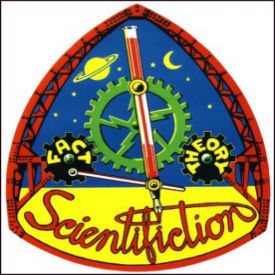 At one time or another many of us have been asked which science fiction novel we consider to be the greatest of all time. I find myself asked this question quite frequently, especially from my friends that don’t read science fiction.
At one time or another many of us have been asked which science fiction novel we consider to be the greatest of all time. I find myself asked this question quite frequently, especially from my friends that don’t read science fiction.
Each time they ask the question I end up staring blankly at their faces. The titles of dozens of novels dance through my head. Every answer that comes to mind is both the right answer and the wrong answer.
Each of us has our personal preferences. Your friend might think a novel they just read is the greatest thing in print, while you might disregard it as a waste of time. Is one person right and the other wrong?
Each reader has their own notion of what makes great science fiction. Does that mean it is impossible to quantify greatness, or is there some elusive measuring stick with which to evaluate science fiction novels?
Some might suggest the best way to measure a novel’s success is by the number of units it sold. Publishers make a living with this measuring stick, but we are digging deeper than commercial success. We are looking for greatness. Yes, sales can be an indicator of greatness, but perhaps we can all agree that some bestselling novels really aren’t that good.
One quantifiable method to determine greatness is by the number of awards a novel has won. Awards are handed out in a subjective manner with voters picking their favorites. It seems a bit contradictory to use the subjective designation of the novel’s greatness for an objective study, but using a dispersed voting body across many different awards can lead us to a universal opinion.
While awards are often accused of being biased or limited in scope, we will push forward using the awards to provide the foundation for demonstrating a novel’s greatness. Other factors we will include in the evaluation are the commercial success of the novel, the stature of the author, critical acclaim, and any other elements that may help us present the case for greatness.
We will also endeavor to use sound judgment in the selection of the greatest science fiction novels of all time. Some circumstances, may have led to some very great works not receiving all of the awards they deserved. After all, if the two greatest novels ever written were published the same year, only one can win the award. The other would be left holding a long list of nominations and no trophies to put on the shelf. Furthermore, many of the greatest novels were published before any awards even existed.
As we continue to add to our list, we will refrain from ranking them in order of greatness. It is not possible to select a single novel as the greatest of all time. Each novel selected for the list will be presented along with evidence that proves it is one of the greatest science fiction novels of all time.
Ultimately, you will need to judge if you consider it a worthy candidate. There are many amazing novels written throughout the years, so it might take a while to get to your favorite. Please feel free to offer suggestions and recommendations in the comments section. I’m guessing your favorite is already on my list, but I don’t want to leave any out.
This week we will break new ground by returning to an author who already has an entry on our list, but before we get to this week’s entry, let us review our list so far.
The Greatest Science Fiction Novels of All Time
- Rendezvous on Rama by Arthur C. Clarke (Best Novel Awards: Hugo 1974, Nebula 1973, Locus 1974, Campbell 1974, British Science Fiction Association 1973, Jupiter 1974, Seiun 1980)
- Gateway by Frederik Pohl (Best Novel Awards: Hugo 1978, Nebula 1977, Locus 1978, Campbell 1978)
- The Dispossessed by Ursula K. Le Guin (Best Novel Awards: Hugo 1975, Nebula 1975, Locus 1975, Jupiter 1975; Nominations: Campbell 1975)
- Dune by Frank Herbert (Best Novel Awards: Hugo 1966, Nebula 1966; Nominations: Hugo 1964 for Dune World)
- Neuromancer by William Gibson (Best Novel Awards: Hugo 1985, Nebula 1985, Philip K. Dick 1984; Nominations: Campbell 1985, British Science Fiction 1984)
- Startide Rising by David Brin (Best Novel Awards: Hugo 1984, Nebula 1984, Locus 1984)
- Ancillary Justice by Ann Leckie (Best Novel Awards: Hugo 2014, Nebula 2014, British Science Fiction 2013, Arthur C. Clarke 2014; Best First Novel Awards: Locus 2014, Kitschies Golden Tentacle 2013; Nominations: Philip K. Dick 2013, James Tiptree, Jr. 2013, Compton Crook 2014, Campbell 2014)
- The Forever War by Joe Haldeman (Best Novel Awards: Hugo 1976, Nebula 1975, Locus 1976)
- Frankenstein; or, The Modern Prometheus by Mary Shelley
- Twenty Thousand Leagues Under the Sea by Jules Verne
 The Left Hand of Darkness by Ursula K. Le Guin
The Left Hand of Darkness by Ursula K. Le Guin
Title: The Left Hand of Darkness
Author: Ursula K. Le Guin
First Year Published: 1969
Awards:
- Nebula Award for Best Novel 1970
- Hugo Award for Best Novel 1970
- James Tiptree, Jr. Retrospective Award
The Left Hand of Darkness is a masterpiece. Ursula K. Le Guin is one of the great authors of American literature and the fact that her writing can be categorized as science fiction makes her creation that much more amazing.
When the novel was published, there were only two major science fiction awards available on Earth. The Left Hand of Darkness won both awards. Much later the novel was presented a James Tiptree, Jr. Retrospective Award. In 1987, Locus Magazine ranked Le Guin’s novel as the second best science fiction novel of all time.
The Left Hand of Darkness is one of those rare books that has managed to find its way onto required reading lists for schools around the world. While the novel is masterfully written and deeply entertaining, its true greatness comes from the exploration of ideas and culture that Ursula explores within its pages.
The Left Hand of Darkness is a landmark novel that explores the concept of sexuality. The novel transcends standard entertainment by challenging our minds. It forces the reader to consider possibilities that push the boundaries of society.
Ursula K. Le Guin provides the reader with a glimpse of a wondrous reality that blurs the line between male and female.
The novel is part of Le Guin’s greatly acclaimed Hainish Cycle and takes place in her futuristic universe.
Last year I had the opportunity to ask Ursula to describe the creation of The Left Hand of Darkness during an interview. This is what she shared with me:

Copyright © by Marian Wood Kolisch
“At the distance of over forty years, I can’t tell you much about the process of conceiving and writing Left Hand, except that I wanted to think about what gender actually is, and I do most of my thinking by writing fiction and poetry, so when I had an idea about people who were gender-free most of the time and only occasionally male or female, I followed that idea into the novel. It took a lot of working out and brooding over. Sometimes when I was writing it I’d come to a stop because I didn’t know how the Gethenians would think and feel about something. Then one of the Gethenian myths and stories — alternate chapters in the book — would come to me and I’d write it down, and it would get me to where I needed to be to go on with the story.”
The Left Hand of Darkness by Ursula K. Le Guin is both entertaining and educational. It is a novel that both satisfies and challenges. The novel has made an impact on the minds of all those who have read it. The Left Hand of Darkness is truly one of the greatest science fiction novels of all time.










